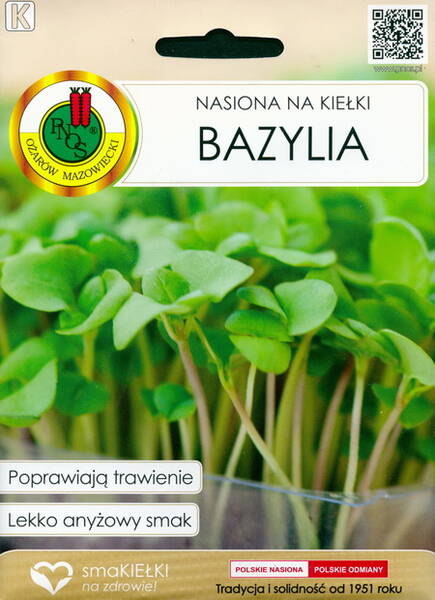The seeds are intended for growing young leaves. The leaves have a pleasant aniseed flavor.
Microgreen of basil leaves are rich in vitamins, antioxidants, minerals and chlorophyll.
They are also highly valued for their high nutritional value: they strengthen health, stimulate digestion, metabolism and activate the entire body.
Basil leaves are especially rich in vitamin E, which protects cell membranes from the harmful effects of free radicals.
Seeds can be sown all year round in seed boxes or boxes with a low polymer content - the seedlings need light, warmth, fluffy and fertile substrate.
It has long been known that green food has a positive effect on human health and protects the body from age-related degenerative diseases.
Instructions for use: pour the amount reguired in to a bowl of water at room temperature and allow them to soak for 8-10 hours.
Subsequently place the seeds into your sprouter covering no more than 25% of the tray as the seeds will in size. Put the sprouter in a light spot at room temperature changing the water 2-3 times a day.
The sprouts will be ready in about 6-10 days. Cut the sprouts about the seed and wash them before eating. They will keep in the fridge for up to a week (8-10 days).
* What are microgreens.
Microgreens are young shoots of vegetables or root crops at the stage when their first leaves are just beginning to emerge.
Microgreens are not new crops, but the familiar radishes, broccoli, daikon, onions, mustard, etc. Only in this case they are eaten very young: 5-12 days after sowing, depending on the type of plant.
Microgreens should not be confused with sprouts. Sprouts are seeds with barely hatched roots, in which growth hormones have not yet been synthesized.
The main qualities of microgreens are a high concentration of vitamins and minerals, which is on average 5-6 times higher than that of "adult" plants. Scientists have proven that, for example, in microcabbage, at the time of active growth, the content of vitamin E is 40 times higher than in a mature vegetable. Microgreens provide the body with many vitamins, for example, C, E, K, B, as well as vegetable protein, potassium, calcium, magnesium, iodine, iron, antioxidants that suppress the development of pathogenic microflora. Digestion, thanks to the use of young sprouts, is also normalized.
The fact is that the body very easily absorbs microgreens, and to get the maximum benefit per day, it is enough to eat about 30 grams of green shoots. Such a small portion contains a sufficient amount of vitamins and microelements, which is necessary for normal well-being.
Microgreens are popular among people who adhere to the basics of healthy eating or want to improve its quality. And this is not surprising, because it is very easy to get the maximum benefit from young plants - such superfood is easy to grow at home. You can do this on a windowsill or on a loggia. Growing microgreens does not require large material and time costs, but the benefits that young plants bring to the body are undeniable. Using microgreens is not just a trendy and popular trend used by chefs in restaurants, it is a truly wonderful way to give your body benefits and essential substances!















